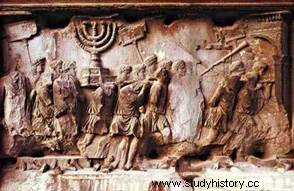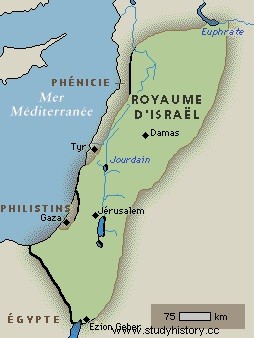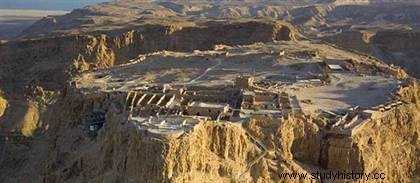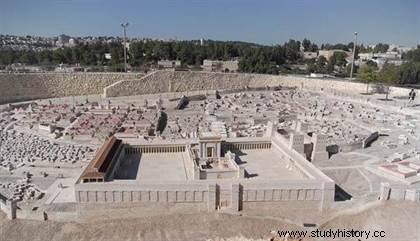 The Kingdom of Israel was probably born in the 12th century BC> . According to the Old Testament, it was founded by King Saul (1020-1000 BC). During the reigns of David and then Solomon, it reached its peak before experiencing periods of division and foreign occupation. Far from competing with Mesopotamian or Egyptian power, the ancient kingdom of Israel nevertheless marked the history of humanity. Unlike their neighbours, the Hebrews worshiped only one god, Yahweh. Their religion was to exert a great influence on both Christianity and Islam.
The Kingdom of Israel was probably born in the 12th century BC> . According to the Old Testament, it was founded by King Saul (1020-1000 BC). During the reigns of David and then Solomon, it reached its peak before experiencing periods of division and foreign occupation. Far from competing with Mesopotamian or Egyptian power, the ancient kingdom of Israel nevertheless marked the history of humanity. Unlike their neighbours, the Hebrews worshiped only one god, Yahweh. Their religion was to exert a great influence on both Christianity and Islam.
Bible Lands
The history and founding myths of the Jewish people are told in the Bible, which describes the first wanderings in the Fertile Crescent of these men from Mesopotamia. According to biblical accounts, the Hebrews experienced a long period of captivity in Egypt. Then Moses led them through the Sinai Desert to the "Promised Land" of Canaan. There, under Joshua's leadership, they subjugated the majority of the native peoples of the land. According to one of the most famous legends, the walls of Jericho crumbled at the sound of the trumpets.
 The Hebrews organized themselves into tribes, led by "Judges". Faced with the resistance of the Philistines, a warrior people living near Gaza, in the southern coastal plain, the conquerors decided to unite under the aegis of a single king, Saul (c. 1020-1006 BC). VS). His successor David (c. 1006-965 BC), defeated the Philistines and submitted the neighboring states, Moab and Edom, to the authority of Israel. The last Canaanite stronghold to capitulate, Jerusalem became the capital of its kingdom. While it is impossible to verify the accuracy of the Bible accounts, the results of archaeological excavations corroborate the conquest of the land of Canaan and the founding of the kingdom of Saul. David's military successes are said to be partly due to the inability of Mesopotamia and Egypt, then struggling with their own difficulties, to resist him.
The Hebrews organized themselves into tribes, led by "Judges". Faced with the resistance of the Philistines, a warrior people living near Gaza, in the southern coastal plain, the conquerors decided to unite under the aegis of a single king, Saul (c. 1020-1006 BC). VS). His successor David (c. 1006-965 BC), defeated the Philistines and submitted the neighboring states, Moab and Edom, to the authority of Israel. The last Canaanite stronghold to capitulate, Jerusalem became the capital of its kingdom. While it is impossible to verify the accuracy of the Bible accounts, the results of archaeological excavations corroborate the conquest of the land of Canaan and the founding of the kingdom of Saul. David's military successes are said to be partly due to the inability of Mesopotamia and Egypt, then struggling with their own difficulties, to resist him.
David ceded his throne to his son Solomon (965-928 BC). Placed under the sign of peace, his reign saw the realization of major architectural projects. The most important was the Temple of Jerusalem, intended to house the Ark of the Covenant, which contains the Tables of the Law given by Yahweh to Moses on Mount Sinai. However, the enormous cost of these works earned Solomon a growing unpopularity among his subjects:many of them were indeed conscripted by force on the shipyards. He was also accused of having ceded land to the Phoenician city of Tyr, in the north of the country, in exchange for craftsmen and building materials. Furthermore, he was suspected of worshiping gods other than Yahweh.
Divisions and disunity in the kingdom of Israel
 When Solomon died, the tribes of northern Israel tried to raise awareness of their fate for his successor, Jeroboam II, who reigned from 928 to 911 BC. J.-C. Faced with his refusal to give them his attention, a revolt broke out. It led to the division of the state into two:Israel in the north, while the southern tribes formed the kingdom of Judah, each ruled by its own monarch. This disunity of the Hebrew people could not have come at a worse time:ruled by the Pharaoh Sheshonq, Egypt was reborn from its ashes.
When Solomon died, the tribes of northern Israel tried to raise awareness of their fate for his successor, Jeroboam II, who reigned from 928 to 911 BC. J.-C. Faced with his refusal to give them his attention, a revolt broke out. It led to the division of the state into two:Israel in the north, while the southern tribes formed the kingdom of Judah, each ruled by its own monarch. This disunity of the Hebrew people could not have come at a worse time:ruled by the Pharaoh Sheshonq, Egypt was reborn from its ashes.
In 924 BC. J.-C, the Egyptians invaded Judah and Israel, destroying many cities on their way and subjecting the Hebrews to the payment of a tribute. Far from appeasing the conflicts between the two kingdoms, this conquest revived them, which provided an opportunity for the vassal states of Moab and Edom to regain their autonomy. According to the Bible, religious disputes aggravated the situation. King Ahab of Israel (873-852 BC) was indeed accused of introducing the cult of Baal, a Phoenician god. Religious leaders, or prophets, like Elijah and Elisha warned their people against heresy and internal dissension.
Assyrian and Babylonian dominions
In the 9th and 8th centuries BCE, the Assyrian Empire, which then dominated the region, posed the main threat to the Hebrew kingdoms. Israel and Judah soon fell under his yoke. The few movements of revolt manifesting themselves here and there were savagely repressed and thousands of captives deported to Assyria. By collapsing, in 612 BC. AD, Assyrian power gave way to the Neo-Babylonian Empire. In 597 BC. AD, Nebuchadnezzar II bloodily crushed a rebellion in Judea:Jerusalem was sacked, Solomon's Temple destroyed, its treasures looted.
Thousands of Jews - as the Hebrews were now called - were forcibly taken to Babylon. During their exile, the Jews drew comfort and support from religion, the guarantor of their people's identity. It was at this time that most of the books that make up the Old Testament of the Bible were written in their final form.
The Jewish Diaspora
In 539 BC. J.-C, the Persian king Cyrus seized Babylon and authorized the Jews to regain their grounds; many, however, chose to stay. Included in the Persian sphere of influence, the Jewish kingdoms fell with it under the domination of Alexander the Great. Subject to Hellenic customs, the Jews rose up, creating, in 142 BC. AD the independent kingdom of Judea, whose existence was short-lived. In 63 BC. J.-C, it was integrated into the Roman Empire. The last king of Judea, Herod the Great, a vassal of Rome, maintained during his controversial reign the illusion of the kingdom's past.
 At that time there were different Jewish sects. The teachings of one of their leaders, Jesus (6 BC - 30 AD), gave birth to a new religion, Christianity. Other Jewish sects, like that of the Zealots, fought the domination of Rome by fomenting violent riots, repressed in blood. In AD 73, the fall of the fortress of Masada put an end to Zealot resistance. After this uprising, the Romans destroyed the Temple of Jerusalem and carried its treasures in triumph through the streets of Rome.
At that time there were different Jewish sects. The teachings of one of their leaders, Jesus (6 BC - 30 AD), gave birth to a new religion, Christianity. Other Jewish sects, like that of the Zealots, fought the domination of Rome by fomenting violent riots, repressed in blood. In AD 73, the fall of the fortress of Masada put an end to Zealot resistance. After this uprising, the Romans destroyed the Temple of Jerusalem and carried its treasures in triumph through the streets of Rome.
With each defeat, new Jews had to go into exile. From the beginning of the 4th century, most of them had left their homeland for the Near East or the Mediterranean shores, settling at major commercial crossroads and in port cities. The dispersion of Jews around the world is known as the Diaspora. This persisted until modern times, the Jews being the object of persecutions where they settled, often on the part of Christians who accused them of having killed Christ. The Jews remained without a homeland until 1948, when the State of Israel was created.
Bibliography
- The Biblical Forgotten Kingdom, by Israel Finkelstein. Editions Odile Jacob, 2013.
- A Brief Biblical History of Israel, by Tidiman Brian. Biblical Institute, 2006.
